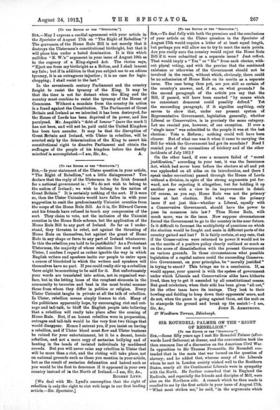TIIR EDITOR OF THE " SPECTATOR."]
Sin,--Is your statement of the Ulster question in your article, " The Right of Rebellion," not a little disingenuous P Yon declare that the reply of the Ulstermen to the Irish demand for a national government is : " We do not wish to belong to the nation of Ireland ; we wish to belong to the nation of Great Britain." It is certainly nothing of the sort. If it were so, then the Ulster Unionists would have fallen in with your suggestion to omit the predominantly Unionist counties from the scope of the Home Rule Bill. As it is, Sir Edward Carson and his friends have refused to touch any compromise of the sort. They claim to veto, not the inclusion of the Unionist counties in the Home Rule scheme, but the application of the Home Rule Bill to any part of Ireland. So far as I under- stand, they threaten to rebel, not against the thrusting of Home Rule on themselves, but against the grant of Home Rule in any shape or form to any part of Ireland whatsoever. Is this the rebellion you bold to be justifiable P As a Protestant Ulsterman, the majority of whose relations live and work in Ulster, I confess I regard as rather ignoble the way in which English writers and speakers incite our people to enter upon course of bloodshed in which the writers and speakers will themselves have no part. If you could really stir up a rebellion there might be something to be said for it. But unfortunately your words are translated into action, not in organized war- fare, but in the letting loose of the roughest elements in the community to terrorize and beat in the most brutal manner those from whom they differ in politics or religion. Every Ulster Unionist laughs in private at all the talk of rebellion. In Ulster, rebellion means simply licence to riot. Many of the politicians apparently hope, by encouraging riot and out- rage and tall-talk, to bluff the English people into believing that a rebellion will really take place after the coming of Home Rule. But, if an honest rebellion were in preparation, outrages and tall-talk would be the very first two things that would disappear. Hence I entreat you, if you insist on having a rebellion, and if Ulster blood must flow and Ulster business be ruined for your entertainment, let it be a decent, heroic rebellion, and not a mere orgy of sectarian bullying and of beating in the heads of isolated individuals by maddened crowds. But you will never raise any rebellion in Ulster that will be more than a riot, and the rioting will take place, not on national grounds such as those you mention in your article, but as the result of sectarian defamation and hatred such as you would be the first to denounce if it appeared in your own country instead of in the North of Ireland.—I am, Sir, &c.,
ROBERT LYND.
[We deal with Mr. Lynd's assumption that the right of rebellion is only the right to riot writ large in our first leading article.—En. Spectator.]


































 Previous page
Previous page